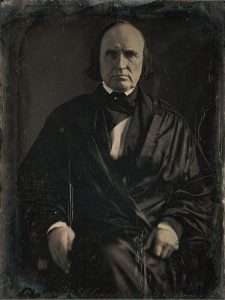The Volokh Conspiracy
Mostly law professors | Sometimes contrarian | Often libertarian | Always independent
Today in Supreme Court History: January 11, 1830
1/11/1830: Justice John McLean takes oath.

Editor's Note: We invite comments and request that they be civil and on-topic. We do not moderate or assume any responsibility for comments, which are owned by the readers who post them. Comments do not represent the views of Reason.com or Reason Foundation. We reserve the right to delete any comment for any reason at any time. Comments may only be edited within 5 minutes of posting. Report abuses.
Please to post comments


Dunn v. United States, 284 U.S. 390 (decided January 11, 1932): notable as the last opinion by Holmes, which he read from the bench (in a weak voice) the day before he resigned at age 90: sustaining conviction for nuisance for keeping liquor (this was during Prohibition) even though it was logically inconsistent with acquittals on the same evidence for selling and unlawful possession (later narrowed to the point of overrule, as one can see in United States v. Powell, 1984)
Ransom v. FIA Card Services, N.A., 562 U.S. 61 (decided January 11, 2011): Chapter 13 (non-liquidation) debtor can't claim "car ownership costs" because did not make loan or lease payments (he owned it free and clear and could claim only "operating costs")
Brown v. Sanders, 546 U.S. 212 (decided January 11, 2006): affirming death penalty where jury found four "special circumstances" of aggravation, only one of which would have mandated execution, even though two of them were held by appeals court to be impermissibly redundant or vague
Ratzlaf v. United States, 510 U.S. 135 (decided January 11, 1994): defendant transferring $ in amounts less than $10,000 was not aware that bank was required to report transactions of that size or larger and therefore did not violate antistructuring statute, 31 U.S.C. §5234(3); Congress later removed the willfulness requirement; see 6 F.4th 380 n.5
Silkwood v. Kerr-McGee Corp., 464 U.S. 238 (decided January 11, 1984): Those of us of a certain age remember Karen Silkwood, who was repeatedly contaminated with plutonium while working at a nuclear power plant and was killed in a mysterious car crash while on the way to meet a journalist. Her father as administrator of her estate sued the plant operator and won punitive damages under Oklahoma law. Here, the Court holds that the punitive award was not preempted by the liability limiting provisions of the Atomic Energy Act of 1954 or the Price-Anderson Act of 1957.
Did they ever find out what really happened with Karen Silkwood?
I don’t think so.
That really happened?? I thought it was just some BS movie.
Made, of course, into a movie with Meryl Streep and Cher. (The former played Silkwood.) It was strongly implied, IIRC, that the car crash wasn't an accident.
Also strongly implied that the Cher character was in on it.
I don't see how Powell substantially alters Dunn. Inconsistent verdicts in criminal cases are still treated as an improper but unreviewable act of mercy by the jury, acquitting a defendant on a count where the verdict should have been guilty.
A good line from Powell: Inconsistent verdicts therefore present a situation where "error," in the sense that the jury has not followed the court's instructions, most certainly has occurred, but it is unclear whose ox has been gored.
A good example of my being misled by Shepard’s, which red-flags Dunn and says, “abrogation recognized by United States v. Powell“. A slower reading of the Powell case shows that you are correct. The Shepard’s folks were possibly misled (as I was) by Rehnquist’s remark, “although not expressly reaffirming Dunn, this Court has on numerous occasions alluded to its rule as an established principle” — in other words, it was “more honor’d in the beach than in the observance”, Hamlet, I, iv, 18.
Thanks!
"breach", not "beach" (good god . . .)
I believe "keeping" is what we would now call "possession with intent." (i.e., to sell).